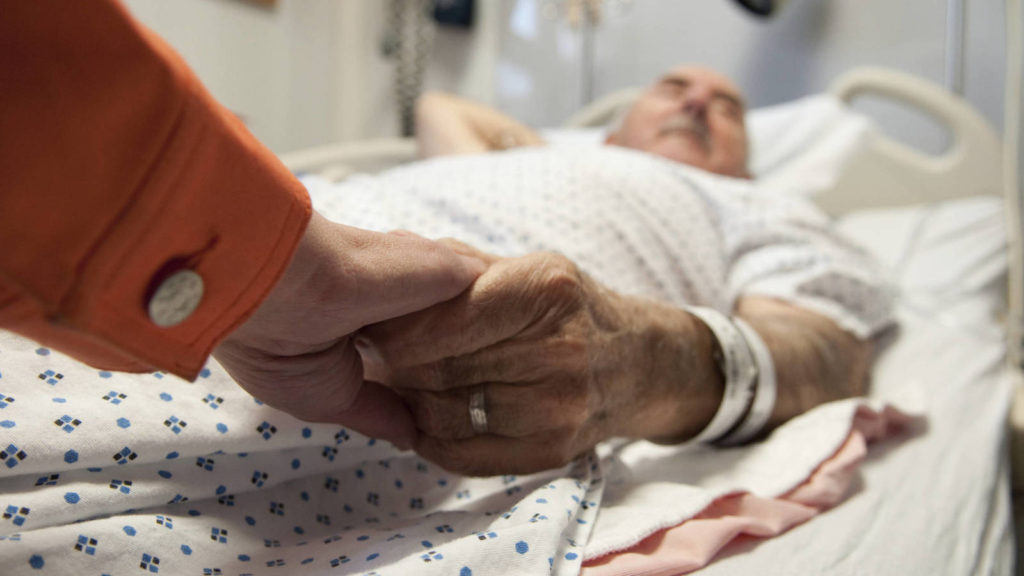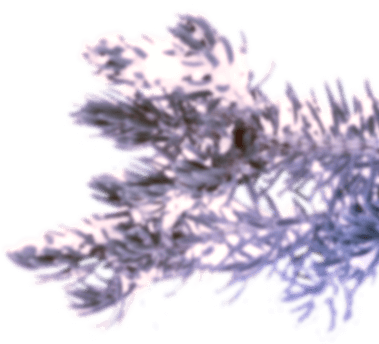Apr 13., 2018 / Features, General, Soul Food
An Easter Grace
He will leave us soon. As I wash his emaciated body, so worn out by disease, I ask him: Will this be our last goodbye, Daddy? When I feed him his glass of Jevity, the only thing he can now take, I agonize at how his body, once strong and vibrant, has now been reduced to skin and bones that I can close my fist around his upper arm. It is heartbreaking.
Dementia, without the complications of other diseases that could mercifully shorten suffering and hasten death, is a cruel monster: sadistic in its infinite patience and merciless in its systematic and progressive conquest. It is nothing but a thief, for not only does it steal the person’s mind — the capacity of the brain to remember, to make sense of the world, to integrate experiences and to make reasoned judgments — but it also, in its terminal stage, steals the brain’s lower functions that control the body. So it was with my father.
 Dementia began its slow, insidious conquest 23 years ago. My father walked out of our house to check into the hospital for an elective brain microsurgery. After another, emergency brain surgery because of a post-operative stroke, 11 days in the ICU and 40 days in the hospital, he finally came home. Or rather, he never came back to us. The signs were all there, but we were slow to recognize them, out of ignorance and denial. First he misplaced car keys, then he misplaced the car. He forgot appointments, then names, then faces. He grew paranoid, accusing us of hiding his files, his checkbook, his trousers. Then he lost his sense of balance, reducing his once confident stride into a shuffle. Soon he couldn’t recognize people: first relatives, then one by one, like a death sentence to us, his own children. Finally my mother. He couldn’t walk anymore. Later he lost his speech. Later the ability to chew food. To sit on his own. Each successive minor stroke taking away a vital function from him, and with that, a vital part of who he was to us. It was a gradual, harrowing experience, a dawning horror, of realizing we have inexorably lost our father, even before death could claim him.
Dementia began its slow, insidious conquest 23 years ago. My father walked out of our house to check into the hospital for an elective brain microsurgery. After another, emergency brain surgery because of a post-operative stroke, 11 days in the ICU and 40 days in the hospital, he finally came home. Or rather, he never came back to us. The signs were all there, but we were slow to recognize them, out of ignorance and denial. First he misplaced car keys, then he misplaced the car. He forgot appointments, then names, then faces. He grew paranoid, accusing us of hiding his files, his checkbook, his trousers. Then he lost his sense of balance, reducing his once confident stride into a shuffle. Soon he couldn’t recognize people: first relatives, then one by one, like a death sentence to us, his own children. Finally my mother. He couldn’t walk anymore. Later he lost his speech. Later the ability to chew food. To sit on his own. Each successive minor stroke taking away a vital function from him, and with that, a vital part of who he was to us. It was a gradual, harrowing experience, a dawning horror, of realizing we have inexorably lost our father, even before death could claim him.
That’s true. Your love cannot touch him anymore. But I can.
God.
Holy Week 2012. My father had his fifth stroke a few months before. In the meantime, I was struggling with the points for the Easter session in our Holy Week Retreat. I told the sisters, and I told God: Good Friday I can handle, because I am familiar with the sorrowful mysteries. But Easter? When it is anything BUT Easter in my own life? So I begged the Lord for help. On Holy Wednesday I went to mass at a church. During the homily, I found myself weeping, not because I was touched by the preaching. On the contrary, I wanted to go up to the altar and strangle the priest. I was furious. He was saying that God desired us to suffer to teach us a lesson. I wanted to go up to him to demand: tell me, what lesson can my father learn if after five minutes he will not remember anything? And if the lesson is meant for us, the family, what kind of God would inflict suffering on someone in order to teach others a lesson? Back in the Cenacle, I poured out all my fury to God in prayer. God simply listened. When my ranting petered out into a painful, keening silence, God gently asked me: But Cecille, what is your deepest pain? What is hurting you the most? I was stunned by that question, and without thinking, I blurted out: We cannot reach Daddy anymore, God. Our love cannot touch him anymore. There, I said it. And the speaking was liberating in itself: I had given voice to a pain that hitherto remained beneath consciousness, acknowledgment and acceptance. God considered my answer for a moment, then quietly, gently said: That’s true. Your love cannot touch him anymore. But I can. When I heard those words I broke down in tears once again, but this time in awe and joy and gratitude. At that moment, I suddenly understood Easter. No, it was more than that. I lived it, for I was given a glimpse of the resurrection. There lies, in those few words of God, the profound paradox of Easter: the Risen Lord still bore his wounds; there was no miraculous cure of dementia that would rescue my father from the mind’s oblivion. And yet the Lord lives, victorious over sin and death. And yet my father is never alone, unreachable to everyone, it’s true, but safe and loved, in God’s everlasting embrace. This is what Easter is all about: that we are irrevocably loved, no matter what, and that nothing can ever separate us from God (as St. Paul says), not the darkness of mental illness, not even death.
It has been six years now, since that singular Easter grace. My father is dying now; he will leave us soon. But still I draw strength and courage from that grace, and I discover new depths of truth from it. I am learning, in the bittersweet moments of caring for my father, that it is not really true, what people say, about dementia. That the person you knew before the disease is gone, and that all you have left is just a physical shell. No. The strong, self-assured man who proudly attended PTA meetings, who gave us a real and lasting love for books, who painstakingly taught us the evils of Martial Law, who simply loved buying dresses, jewelry and perfume for his three daughters, is still the same man who lies in front of me, shriveled and coughing up a death rattle, needing me to change his diapers and to feed him. Past and present held together by grace and love: love which is timeless, which finds its only source and fulfillment in the God Who is Love.
He will leave us soon. He is crossing over. And in this realm between life and death I know that he is not alone. “Even though I walk through the valley of the shadow of death, I fear no evil, because you are with me…(Psalm 23)” Pope Benedict, reflecting on these same lines, wrote these memorable words in Spe Salvi: “The true shepherd is one who knows even the path that passes through the valley of death; one who walks with me even on the path of final solitude, where no one can accompany me, guiding me through: he himself has walked this path, he has descended into the kingdom of death, he has conquered death, and he has returned to accompany us now and to give us the certainty that, together with him, we can find a way through.” So even now my father walks this shadowed valley, together with the Eternal Shepherd. With this Passover God he walks free from the evil thrall of dementia; here he remembers, here my father knows who he is. And in that conviction, I find Easter gracing my heart with hope.
A reflection contribution from
Sr. Cecille Tuble, rc
Sr. Cecille’s father peacefully went home to God a day after she wrote this essay on April 12, 2018









